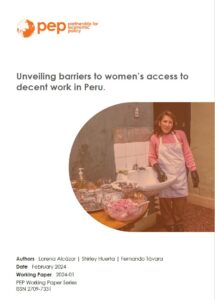Unveiling barriers to women’s access to decent work in Peru.
| Year | : | 2024 |
|---|---|---|
| Author/s | : | Lorena Alcazar, Fernando Távara, Shirley Huerta |
| Area/s | : | Employment, productivity and innovation, Ethnicity, gender and citizenship |
Alcázar, L., Huerta, S. y Távara, F. (2024). Unveiling barriers to women’s access to decent work in Peru. PEP Working Paper Series 2024-01. PEP.
Peru suffers from a serious gender inequality problem in the labor market that cannot be understood by considering employment rates alone. Rather, it is also necessary to analyze the conditions under which women participate in the labor market. This study seeks to identify economic, legal, and socio-cultural barriers that women face in accessing decent employment. We use formal work as an indicator of decent employment and add an innovative non-precarious employment indicator that is relevant in the Peruvian context given that less than 25% of employed women work in the formal sector. This indicator considers the following minimum acceptable working conditions: at least the minimum legal salary and a legally defined maximum number of working hours. The study provides a comprehensive view of the barriers by using a mixed methodology that includes an econometric estimation of barriers and interviews and focus groups with working and non-working women. The results show that the main barriers that hinder access to decent work in Peru are related to gender stereotypes both in the household (where household and care tasks are entrusted almost exclusively to women) and in the labor market (where women face discrimination and sexual harassment). Given that women need to take care of their children, and given the lack of care services available, many of them end up taking low-quality jobs.






